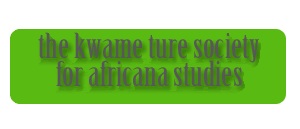In his autobiography, Ready for Revolution: the Life and Struggles of Stokely Carmichael [Kwame Ture], Kwame Ture describes his time at Howard University.
In the chapter aptly named "Howard University: Every Black Thing and Its Opposite," Ture credits his Howard experience with giving him the education that proved vital in that stage of his development.
Though we now know Ture as a giant figure in the proud legacy of Howard, he was once just another freshman in Drew Hall. This chapter gives the reader a glimpse into that time of his life while teaching a very important lesson about self-determination.
Anyone remotely familiar with life at The Mecca, or any other HBCU for that matter, will identify with his account. Ture writes that his experience at Howard confirmed him in his determination to struggle with and for his people.
He talks of those whom he labels "Afro-Saxons," seeking to emulate white society and values in hopes of being recognized as relevant, equal or important. These Afro-Saxons could be found across the campus in any number of spaces from administration to the student body.
However, he reminds us that at Howard he found every Black thing and its opposite. To counter these chocolate-covered anglophiles, there were "consciously black intellectuals of the first order" who represented a "splendid, stubborn commitment, a sense of duty and purpose". These people – Sterling Brown, Chancelor Williams, Eugene Holmes, and Arthur Davis among others - were "custodians of tradition, keeping truth alive".
What separates the HBCU from other institutions of higher learning is the burden of service that is intrinsic to its mission. Beyond the pursuit of worldly treasures and social achievement there lies a responsibility to take the education gained and do.
Ture realized that, "In struggle one not only fights against something – injustice, oppression – but one must struggle for something equally real but positive." Because he identified these respective poles in his life, he was able to make the smaller decisions using these as a guide.
He struggled against the compartmentalization of African people into nationalist classifications. So, he made a conscious choice to defy campus social structure and deliberately interact with African students from across the Diaspora instead of restricting himself to those who came from New York with him.
He struggled for the liberation of all African people, without regard to class. Unsurprisingly, he engaged the disheveled man on the street corner and took his suggestion to read George James' Stolen Legacy. He struggled against ignorance and complacency within his own life. Consequently, he joined an extra - curricular reading and discussion group led by Professor Harold Lewis.
Each of us is faced with choices as well. Do you stop and engage the unkempt woman in McDonalds? Do you find that reportedly wise professor and ask for a reading suggestion? Do you postpone the dinner in the café and go to the event discussing political prisoners?
We are deciding now what kind of people we will be forever. There is no dress rehearsal; we are live. For and against what do you struggle?
-
Jocelyn Cole
(Published 2-23-11)
Kwame Speaks: The Significance of Choice
Posted by Kwame Ture at Sunday, May 01, 2011
Subscribe to:
Post Comments (Atom)


0 comments:
Post a Comment